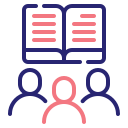Data Literacy and Responsible Use at Work
Ask how a number was collected, what period it covers, and which factors influenced it. Trends, baselines, and segmentation transform raw counts into insight. Good questions protect teams from chasing noise and help focus attention where it truly counts.
Data Literacy and Responsible Use at Work
Before sharing data, consider sensitivity, necessity, and consent. Remove identifiers, limit access, and document purpose. Responsible data handling is not only policy compliance; it is trust-building with colleagues, customers, and communities who rely on your stewardship every day.









